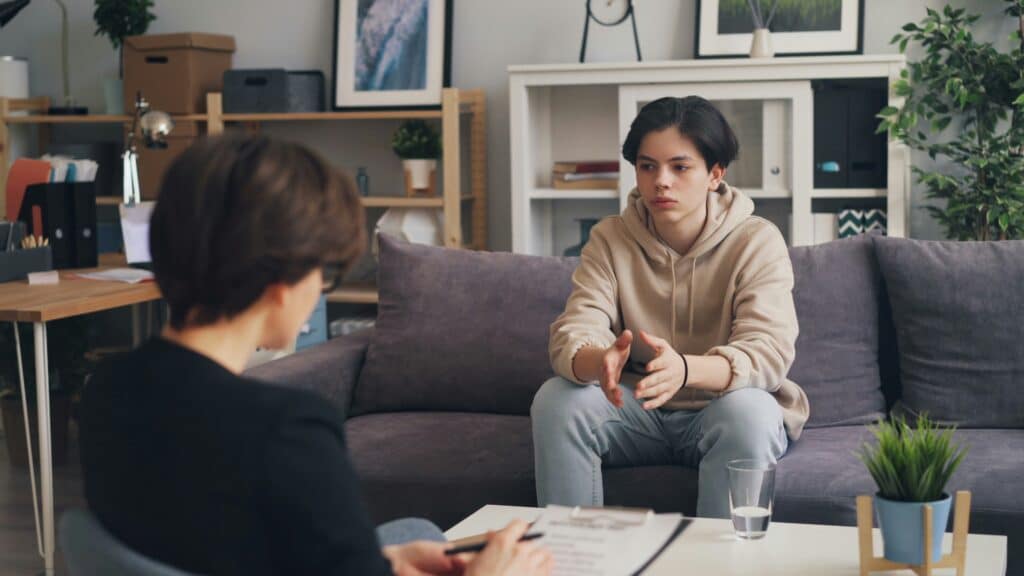When a teen has ADHD, it doesn’t just affect their attention span. It can shape how they experience school, friendships, home life, and their own sense of confidence.
Therapy is one of the most helpful tools for teens with ADHD — not to “fix” them, but to give them strategies that work for their brain, build emotional resilience, and make everyday life more manageable.
In this post, we break down the different types of therapy that support teens with ADHD and their specific benefits.
How Therapy Supports Teens With ADHD
Therapy helps in more ways than parents might expect. It’s not only about managing symptoms; it’s about helping teens thrive in a way that works for them. Below are some of the biggest benefits.
Builds Emotional Regulation Skills
Teens with ADHD often feel emotions more intensely than their peers. Therapy helps them name, understand, and manage those feelings in real time, so they don’t get overwhelmed or shut down when something feels hard.
Supports Self-Esteem and Confidence
Many teens with ADHD grow up feeling like they’re “bad at” school, chores, or relationships. Therapy helps reframe those experiences and gives them tools to succeed, which builds real confidence, not perfection, but progress.
Improves Communication
ADHD can make it hard for teens to express themselves clearly or understand social cues. Therapy offers a safe space to practice communication skills, learn how to ask for help, and navigate tricky conversations at home or with peers.
Teaches Practical Coping Strategies
From planning ahead to handling frustration, therapy gives teens step-by-step strategies they can actually use in daily life. These aren’t just coping tools for now—they’re skills that last into adulthood.
Types of Therapy for Teens With ADHD
The right therapy can make a huge difference. Below are some of the most common types used to support teens with ADHD, along with how each one helps in a unique way.
Cognitive Behavioral Therapy (CBT)
CBT helps teens identify unhelpful thoughts and shift them into something more realistic and productive. It’s especially helpful for teens who struggle with self-doubt, frustration, or negative thinking loops.
How CBT Helps:
- Encourages flexible thinking and problem-solving
- Reduces negative self-talk and shame
- Builds resilience in the face of setbacks
- Helps teens feel more in control of their emotions and actions
Dialectical Behavior Therapy (DBT)
While DBT was originally created for people with intense emotional struggles, it can be highly effective for teens with ADHD, especially those dealing with anxiety, anger, or mood swings.
How DBT Helps:
- Teaches mindfulness and staying grounded
- Builds skills to tolerate distress without acting out
- Helps teens manage emotional outbursts
- Strengthens relationships through better communication
Behavioral Therapy
Behavioral therapy focuses on reinforcing positive behaviors and reducing negative ones through structure, rewards, and clear expectations. While CBT and DBT help teens explore their thoughts and emotions, behavioral therapy is more action-based.
It’s especially helpful for younger teens who may struggle with impulse control or need extra support managing routines.
How Behavioral Therapy Helps:
- Encourages consistent routines at home and school
- Uses rewards and consequences to shape behavior
- Helps teens learn how their actions affect outcomes
- Builds accountability and follow-through
Executive Function Coaching
Executive functioning refers to the mental skills we use to plan, focus, follow through, and manage time. Teens with ADHD often struggle in these areas, which can affect everything from schoolwork to daily routines. Executive function coaching focuses specifically on building those skills.
How Executive Function Coaching Helps:
- Supports time management and organization
- Helps teens break big tasks into manageable steps
- Teaches planning and prioritizing
- Encourages consistent routines and accountability
Family Therapy
ADHD doesn’t just affect the teen; it affects the whole family dynamic. Family therapy brings everyone together to work on communication, boundaries, and shared strategies. It also gives parents tools to support their teen without increasing conflict.
How Family Therapy Helps:
- Improves parent-teen communication
- Helps set realistic expectations and boundaries
- Reduces family tension and frustration
- Gives parents strategies for positive support
Group Therapy
Group therapy helps teens realize they’re not alone. It gives them space to connect with others who understand their challenges and to learn from shared experiences. Groups are usually led by a therapist and often focus on building social and emotional skills.
How Group Therapy Helps:
- Builds peer support and connection
- Strengthens social and communication skills
- Increases confidence and self-awareness
- Offers a safe place to practice new strategies
How to Choose the Right Therapy for Your Teen
There’s no single path that works for every teen with ADHD. The best approach depends on your child’s needs, what they’re struggling with most, and what kind of support they respond to. You might start with one therapy and add others over time—or try a few before finding the right fit.
Here are some steps to help you get started:
Talk to a Mental Health Professional
A licensed therapist, psychologist, or pediatrician can help assess your teen’s symptoms and recommend a treatment plan tailored to their needs.
Consider Your Teen’s Biggest Challenges
Are they struggling with focus at school, emotional outbursts, or social difficulties? Different therapies target different challenges.
Look for Programs That Specialize in ADHD
Therapists or programs with ADHD experience often offer more structured, practical support and are familiar with common co-occurring issues.
Get Your Teen Involved In the Process
When teens feel heard and included, they’re more likely to engage in therapy and stick with it.
Start With One Approach and Adjust as Needed
It’s okay to try something, see how it works, and pivot if it’s not the right fit. Treatment should evolve with your teen.
More FAQs About ADHD for Therapies
1. How do I know if my teen needs therapy or just better structure at home?
It’s normal for teens to struggle with organization or focus sometimes, but if symptoms are interfering with school, relationships, or daily life, therapy can provide tools and strategies that go beyond what you can do at home.
2. What’s the difference between ADHD and typical teenage behavior?
While all teens can be moody, distracted, or disorganized at times, ADHD symptoms are more frequent, intense, and long-lasting. If your teen struggles consistently across different settings (home, school, social life), it may be time to explore an ADHD evaluation.
3. Can my teen still take ADHD medication while in therapy?
Yes. In fact, therapy often works best when combined with medication for those who need it. A psychiatrist or pediatrician can help determine if medication is a good option for your teen.
4. What if my teen doesn’t want to go to therapy?
This is common. Many teens resist at first, especially if they’ve had bad experiences or feel misunderstood. Framing therapy as a space to gain skills, solve problems, and feel more in control can help shift their mindset. Starting with a consult or short-term goal can also ease them in.
5. How long does therapy usually last?
It depends. Some teens benefit from short-term support (a few months), while others work with a therapist for a year or more. Progress tends to build over time, and many families adjust the frequency or type of therapy as their teen’s needs change.
6. Are there school-based options for ADHD support?
Yes. Many schools offer 504 Plans or IEPs for students with ADHD, which can include classroom accommodations or support services. These plans often work best when coordinated with outside therapy.
Get Support That Fits Your Teen’s Needs
When your teen has ADHD, the right therapy can make a real difference in how they function, how they feel, and how they see themselves. It’s not about fixing them. It’s about giving them tools that work.
If you’re unsure where to start, we can help. Our team will listen, ask the right questions, and guide you toward a program that fits your teen’s needs and goals.
Contact us today to learn more about our teen mental health treatment plans.




